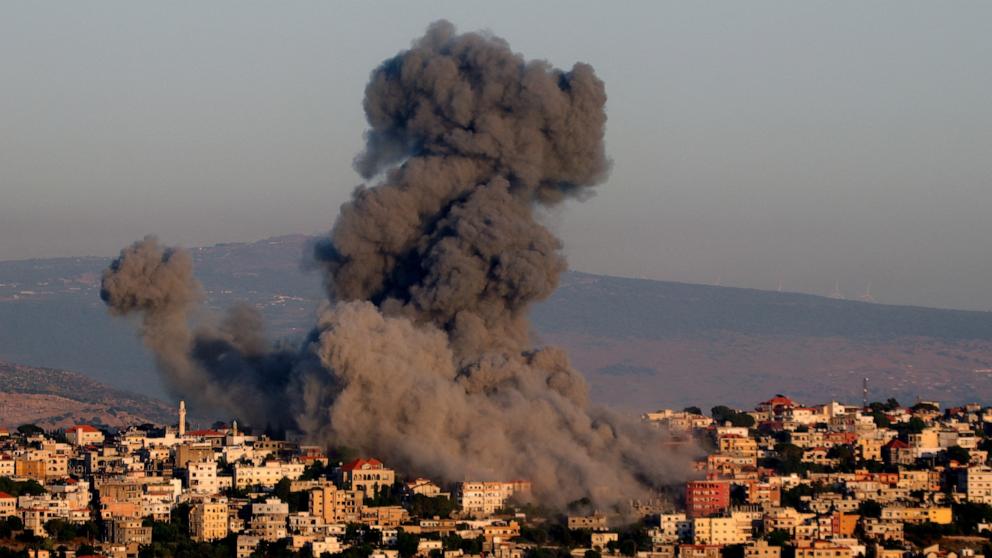Israel prepares for possible war with Hezbollah as Hamas conflict drags on

TEL AVIV: The Israeli military is preparing a gradual withdrawal from the Gaza Strip and is behind the scenes pressuring the government to negotiate a ceasefire with Hamas as soon as possible. At the same time, the military is trying to prepare clear ground for what officials say could lead to a devastating war with the powerful Iranian-backed Lebanese militia Hezbollah.
An Israeli government official said today that if the barometer destroys Hamas’s pre-war capabilities – which included clearly defined battalions with sophisticated coordination and communications – and pushes Hamas out of the Gaza government, then Israel has already achieved that.
Several Israeli politicians, including Prime Minister Benjamin Netanyahu, have indicated that Israel will begin withdrawing its troops from Gaza as it enters the so-called “Phase C” of its war, with a significantly reduced troop level focused on what one politician described as “fighting Hamas hotspots and hunting high-value targets.”
Another Israeli politician admitted to ABC News: “Hamas still has a lot of influence on what happens in Gaza – that’s the main thing. We have to try to create an alternative.”
On Israel’s own status map, which shows the combat status of all 24 pre-war Hamas battalions, one of the battalions in Rafah is marked green, meaning operational, and another is marked orange, meaning semi-operational.
Hamas’s continued influence in the Gaza Strip has not completely curbed lawlessness there. European and Israeli politicians have been warning for months that the Gaza Strip could turn into a “Mogadishu on the Mediterranean” – a reference to the decades of internal fighting and instability in the Somali capital.
At high-level meetings in Washington last week, Israeli Defense Minister Yoav Gallant, U.S. national security adviser Jake Sullivan and Defense Secretary Lloyd Austin discussed possible “day-after” plans for Gaza, four U.S. and Israeli officials told ABC News.
One of the plans calls for an international “board” that U.S. officials liken to a steering committee that would include the United Arab Emirates, Egypt and possibly Jordan. Morocco would send peacekeepers to Gaza, with the U.S. assuming some level of overall oversight and command. The reaction from Arab states to the proposal has been lukewarm, a senior official with direct knowledge of the situation told ABC News.
The “administrative council” would be joined by a new, bottom-up force that would be trained by the U.S. and would include Palestinian Authority contingents to lend it legitimacy. However, the Palestinian contingents would not be so large that Netanyahu, who has publicly rejected any Palestinian Authority role in a future Gaza Strip, would reject the plan, a senior Israeli official told ABC News.
The training of Palestinian forces in Gaza would be overseen by US Lt. Gen. Michael Fenzel, the security coordinator of the Jerusalem-based Israeli-Palestinian Authority. These units would operate in small enclaves in Gaza.
Officials say it is questionable whether such alternatives can be implemented quickly, as they would potentially leave Hamas in control of the power vacuum in Gaza. But a group of senior Israeli officials interviewed this week said that dismantling an already weakened Hamas, which is currently only capable of small-scale attacks on Israel, should be put aside in favor of combating Hezbollah, which poses an existential threat to the state.
To do that, the officials said, Israel needs to gather forces and save ammunition for an upcoming confrontation with Hezbollah, which boasts of having tens of thousands of Iranian-trained fighters, many of whom fought in the Syrian civil war, and thousands of rockets and missiles that could well overwhelm Israel’s air defenses.
Israeli officials said Israel has enough offensive weapons for a war with Hezbollah but could use more from the United States.
Hezbollah said it began its cross-border war with Israel on October 8 in solidarity with the Palestinians after Hamas carried out a terrorist attack on Israel on October 7. Hezbollah’s deputy leader, Naim Kassem, told the Associated Press on Tuesday: “If there is a ceasefire in Gaza, we will stop without further discussion.”
But Hezbollah has also signaled that it will not agree to the US-brokered agreement unless Israel ends the war in Gaza. The Israeli sources told ABC News that Hamas is reluctant to comply with the terms of the internationally brokered ceasefire because it knows that a potential war with Hezbollah would significantly weaken Israel.
The bigger problem is that whatever the approach, it takes time, which U.S. and Israeli officials say works against the process but in Hamas’s favor. Several multi-day operations in which Israel returned to areas it vacated months ago and in which Hamas has since regrouped have shown that the terror group has slowly and quietly reasserted itself in Gaza.
“Hamas has a lot of influence on what happens in Gaza and that is the main reason why we have to try to create an alternative,” an Israeli official told ABC News. “You can even see that in Hamas’ efforts to control the looting of aid convoys.”
Hamas currently has a head start and it is unclear whether an international force can be deployed or a suitable local force trained before it regains a potentially indomitable level of local control.



